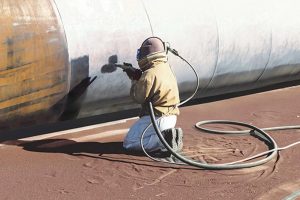Home / News & Blog / Abrasive Blog / 7 Tips for Choosing Abrasive Blasting Media
Abrasive blasting is a powerful method for cleaning, finishing, and preparing surfaces for coatings or further processing. Choosing the right abrasive media can make a significant difference in the effectiveness of your blasting process, as well as the quality and longevity of your results. Here are 7 tips to help you select the best abrasive blasting media for your needs:

The material you’re blasting will influence the type of abrasive you should use. Softer materials, such as wood or plastic, require a softer abrasive like walnut shells or corncobs. For tougher surfaces, such as steel or concrete, harder abrasives like steel shot, glass beads, or aluminum oxide work best.
Different abrasives provide different finishes. If you’re looking for a smooth, polished surface, glass beads are ideal, as they produce a smooth finish with minimal profile. For rougher textures or more aggressive cleaning, steel grit or sand may be more effective.
Abrasive blasting media should be clean to ensure consistent results and to prevent contaminants from affecting your workpiece. For precision jobs, such as automotive or aerospace components, choose clean, virgin media to avoid any contamination or inclusions that may cause defects.
The particle size of the abrasive media affects the effectiveness of the blasting process. Coarse abrasives are suitable for heavy cleaning or surface profiling, while finer abrasives are used for polishing or light cleaning. Make sure to select the right size for the job to avoid unnecessary surface damage.
Some abrasives, like steel shot or glass beads, can be recycled and reused multiple times, making them more economical in the long run. If you’re working on a large-scale project, choosing a reusable media can save you money and time on replacement.
Certain abrasives, such as sand (silica), pose health risks, especially if inhaled. Choose non-toxic, environmentally friendly media like crushed glass, aluminum oxide, or walnut shells to ensure the safety of both your team and the environment.
Different types of equipment may work better with specific media types. For example, dry blasting works well with harder abrasives, while wet blasting may require a softer or more water-compatible abrasive like baking soda or glass beads. Make sure the abrasive media is compatible with your equipment to optimize performance.
Selecting the right abrasive blasting media is crucial for achieving the desired surface finish, improving efficiency, and ensuring safety. Whether you’re cleaning, polishing, or prepping a surface for coating, take the time to choose an abrasive that fits your specific requirements.
At DOMILL, we offer a wide range of abrasive products like Brown Fused Alumina, White Fused Alumina, and Silicon Carbide to suit all your abrasive blasting needs. Contact us today for expert guidance and premium abrasive solutions!
☞Find more information on how to select the right sandblasting abrasive